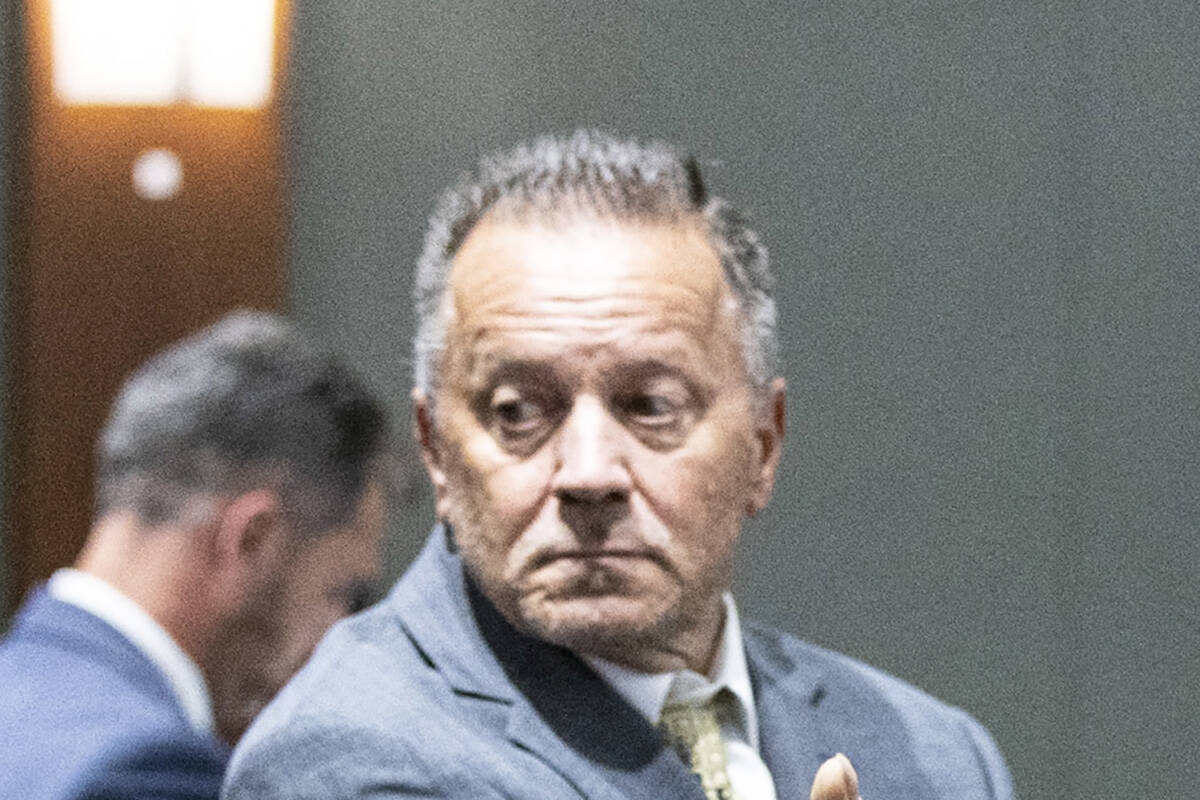Las Vegas police have refused to release records related to their investigation of a veteran defense attorney accused of sex trafficking and plotting to kill a client, but experts say officials are withholding records that should be public.
While under investigation, attorney Gary Guymon, 62, was interviewed by police at least twice and sent police emails, voicemails and text messages in which he tried to explain his actions with his client, according to his Metropolitan Police Department arrest report.
Investigators also monitored his phone communications, police said.
He was arrested Feb. 3 and faces charges that include pandering, sex trafficking, bribing or intimidating a witness, and conspiring to commit murder.
The Las Vegas Review-Journal filed a public records request with Metro on Feb. 5, seeking body camera footage of Guymon’s arrest; audio of his interviews with police; copies of voicemails, text messages and emails he sent police; the affidavit submitted to a judge to obtain permission to wiretap his phone; and records of Guymon’s intercepted calls and messages.
Metro refused to provide any of those records.
The department wrote that Guymon’s case was still open, claimed the agency was covered by “Law Enforcement Privilege” and contended the records sought were “evidence, not a public record.”
According to Metro spokesman Robert Wicks, the department’s legal division said police could not provide the records because they related to an ongoing investigation. He also said no body camera footage exists.
Police offered to reconsider a rephrased request and said more records may become available as the investigation proceeds.
“In this case, after a careful examination of all factors, law enforcement’s interest in nondisclosure clearly outweighs the public’s presumed interest in access,” Metro staff wrote in response to the request. “Therefore, the records you seek are confidential, at least at this time, and must be withheld.”
The department declined to make someone available for an interview.
‘Inconsistent with the law’
Open records experts said police are improperly withholding records that the public should see.
The records requested about Guymon should be released to the public with the redaction of information that would actually harm the investigation, said David Cuillier, director of the Freedom of Information Project at the University of Florida’s Brechner Center for the Advancement of the First Amendment.
“Police officers can detain you,” he said. “They can take away your children. They can kill you. With that power comes a lot of responsibility and the need for transparency. We’ve got to see what they’re doing and so they shouldn’t be hiding behind this exemption.”
Review-Journal Chief Legal Officer Benjamin Lipman said it is a violation of the Nevada Public Records Act not to turn over records based on the premise that entire categories of records are confidential.
“Their claim that anything gathered as part of the investigation is ‘evidence’ and that any ‘evidence’ is outside the requirements of the public records act is inconsistent with the law,” Lipman said.
The Nevada Supreme Court has said that even if parts of a record are confidential, the rest must be turned over, according to Lipman, but police have not indicated a basis for keeping secret all the records requested about Guymon.
And while the state Supreme Court has found that there may be times when portions of law enforcement records may be withheld because law enforcement’s need for secrecy outweighs the public’s right to know, that exemption is meant to be used for portions of records, not as a categorical privilege, he said.
Cuillier suggested that Metro may have a broader problem. He frequently receives calls complaining about the department’s secrecy, “probably more than any agency in the country,” despite data showing that Metro’s release rate is not significantly lower than for other agencies, he said.
“We do not want a secret police force in this country, because we see what has happened in other countries that allow that to happen and it’s not good, it’s not pretty,” Cuillier said. “We need accountability and that requires transparency.”
The “What Are They Hiding?” column was created to educate Nevadans about transparency laws, inform readers about Review-Journal coverage being stymied by bureaucracies and shame public officials into being open with the hardworking people who pay all of government’s bills. Were you wrongly denied access to public records? Share your story with us at whataretheyhiding@reviewjournal.com.
Contact Noble Brigham at nbrigham@reviewjournal.com. Follow @BrighamNoble on X.

